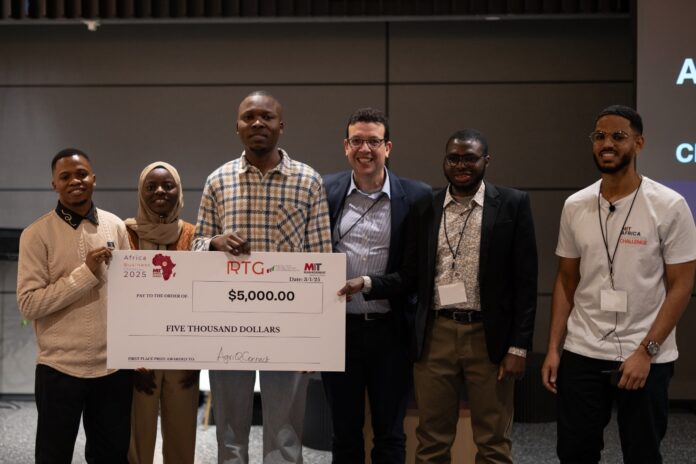In the corridors of the Martin Trust Center for MIT Entrepreneurship this past February, innovation wasn’t just a buzzword—it was a palpable force. The MIT Africa Business Challenge, a first-of-its-kind event at MIT, drew nearly 70 participants from across New England, supported by more than 10 seasoned mentors and 7 accomplished judges. Over a three-week journey, including virtual team formation sessions, hands-on workshops on AI tools and fintech innovation, and culminating in a dynamic two-day, in-person hackathon, students tackled some of Africa’s most pressing challenges—Food Security, Healthcare, and Finance.
Now, as the dust settles and the ideas reverberate beyond Cambridge, organizers have confirmed that the Challenge will return in 2026, promising an even more ambitious platform for innovation and impact.
The Triumphs of 2025
The Challenge wasn’t confined to a weekend sprint—it was a three-week innovation marathon. Kicking off with virtual sessions designed to facilitate team formation and collaboration, participants accessed hands-on workshops on cutting-edge AI tools and a special fintech-building session, equipping them with the resources to refine their ideas. The journey culminated in a two-day, in-person hacking session at the Martin Trust Center, where teams presented their polished solutions to a panel of esteemed judges. Winners were honored at the 14th MIT Africa Innovate Conference, MIT Sloan’s flagship conference celebrating African innovation for over a decade.
1st Place: Agri-Q-Connect (Northeastern University)
A team of four Nigerian PhD students from Northeastern University envisioned a platform connecting farmers directly with processors and incorporating AI-powered storage solutions to reduce post-harvest losses. With Sub-Saharan Africa losing $48 billion annually due to inefficiencies in storage and supply chains, their concept addressed a fundamental bottleneck in food security.
2nd Place: DisruptAfrica (HULT International Business School)

These HULT students created CharteredAI, an AI-powered accounting tool designed to empower African small and medium-sized enterprises (SMEs) with reliable, affordable bookkeeping solutions. In regions where SMEs often struggle with financial management, this innovation held the promise of transforming business practices and unlocking economic potential.
3rd Place: MamaCare (Yale University)
A team from Yale developed Mamacare, a voice-based, internet-free healthline offering essential maternal health information in natural African languages like Yoruba. Designed for low-connectivity regions where English-centric solutions often fail, Mamacare demonstrated how culturally sensitive technology can bridge gaps in healthcare access.
Perspectives from the Frontlines
One of the Challenge’s judges, Kishan Popat, Director of Growth Strategy at Endura Capital, and the former Head of Research for Kestrel Capital (East Africa) observed, “What struck me wasn’t just the creativity of the ideas—it was the maturity of the thought process. Teams weren’t simply building demos; they were crafting solutions with deep understanding of market realities and execution challenges. I left feeling that these students were not just participants; they are emerging leaders from across Africa. The competition was a clear showcase of how African ingenuity and leadership can thrive when paired with a rigorous U.S. educational foundation.”
Mentor Amos Akoto, who guided several teams, reflected: “The hackathon created a unique space where mentorship wasn’t just an accessory but a lifeline. Watching participants absorb feedback, pivot their ideas, and build resilience in real time was a testament to the future of innovation for Africa.”
More Than an Event—A Movement
The inaugural MIT Africa Business Challenge didn’t just end with prizes and pitches—it sparked a ripple effect across the MIT community and beyond. For the first time at the Institute, a platform was created where students from different New England institutions collaborated to develop real-world solutions for Africa. The event tapped into the region’s rich innovation ecosystem, and the response was electric.
Participants spoke of newfound inspiration and connections. Judges and mentors were astounded by the depth and polish of the ideas. Unexpectedly, the Challenge sparked momentum for future initiatives: interest surged in creating accelerators for African startups and replicating similar hackathons across the continent.
This interdisciplinary platform didn’t just foster ideas; it cultivated critical thinking about business models, scalability, and execution. Many participants walked away with more than a project—they left with potential co-founders, mentors, and a renewed determination to turn ideas into action.
Voices of the Founding Co-Leads
Beja Kitondo, from Kenya, shared: “Our goal is for the MIT Africa Business Challenge to become a global watering point for African talent. By leveraging the long-standing research and innovation culture of institutions like MIT, we want to create a global collective of bright young minds focusing on contributing to solving big problems in Africa like Food Security, Healthcare, and Financial Services—the focus areas of the inaugural challenge.”
Ahmad Saaid, from Sudan, emphasized the Challenge’s depth and future: “The spirit of the Challenge wasn’t just to build technical demos, as in traditional hackathons. Participants were forced to think about the business feasibility of their solutions and the macro problems they were addressing. While this was the first iteration of the event, we expect this to take off and become a real tradition at MIT.”
The Journey Ahead
The MIT Africa Business Challenge is more than an event—it’s a movement. With its newly launched LinkedIn page, readers can follow the journey toward the 2026 edition, witness how these ideas evolve, and see how MIT and its partners are participating in Africa’s innovation future.
As the Challenge returns next year, expect bolder ideas, deeper impact, and broader participation. The MIT Africa Business Challenge has firmly planted itself as a platform where innovation, mentorship, and cross-continental collaboration converge—one that promises lasting change for both participants and the broader African innovation ecosystem in the diaspora.
DISCLAIMER: The Views, Comments, Opinions, Contributions and Statements made by Readers and Contributors on this platform do not necessarily represent the views or policy of Multimedia Group Limited.
Tags:
DISCLAIMER: The Views, Comments, Opinions, Contributions and Statements made by Readers and Contributors on this platform do not necessarily represent the views or policy of Multimedia Group Limited.



